Rien Hermans On Why Insurance Is Investment Too
He was only 12 when his father passed away. Looking back, Dutch expat Rien Hermans – now President and Chief Executive of AXA Philippines – is thankful that his old man had a life insurance legacy that provided a lifeline for the family after his untimely demise. Perhaps it’s no mere accident that Rien ended up in the insurance industry after initially thinking of carving a career in advertising or media.
Several years ago, his visiting mother, who was surprised that he landed in this profession, had told him that she’s actually very happy that he was working for an insurance firm. “When she said that, I sort of realized much more how much difference we can make to people’s life in this business,” Rien says. “It’s a little bit used with care, with caution. The moment our products are being priced or offered or sold in the right way and people buy it and do it in the right way, it can make such an enormous difference to somebody’s life. I’ve seen it in different ways,” he adds.
Born in Netherlands, Rien has more than 20 years of experience in the life insurance industry. He has been a resident of Manila for the past three consecutive years, having been at the helm of AXA Philippines since February 2009. He is an expat in the Philippines for the second time around as he previously served as President and Chief Executive Officer of ING Life Philippines for nearly four years until late 2002.
“At a certain moment, you realize that you’ve actually become like an expert in this field – in life insurance. I know the system side, I know the investment side, the financial side and then the marketing side, and it’s not by studying it – it’s more by doing,” he says. Rien has thoroughly learned the business that he has no trouble detecting ongoing changes or anticipating trends in the market. When he first came to AXA Philippines, the company used the strategy of talking to people, asking them how they do take care of themselves or how they think they want to take care of themselves. And surprisingly, people here are actually either saving or investing – quite different from the image of a consumer society conjured in many observers’ heads.
“How many of the apartments which are being sold are now sold with the idea of investing? Those people actually buy an apartment with the idea that when I’m older, I actually can run without and can get money out of it. That’s the same thing; it’s also planning for the future,” says Rien.
“We are being told that we’re more consumers than savers but the savings rate went up enormously over the past two years in the Philippines. Its’ quite high now… So I think the money is there.”
Data from the Bangko Sentral ng Pilipinas showed that the country’s savings rate – computed as gross savings as a percentage of gross national product – was 26.6% at the end of 2009 compared to 22.9% in 2001.
“Of course, you need to take care of your primary needs. You need to be able to eat and have clothes and have a roof above your head before you think of saving or having the same things for next year or five years. That’s normal. But I strongly believe that also the insurance or life insurance industry in the coming 10 years will grow relatively fast,” Riens says.
He also forecasts, “I think in the coming four years, you’ll see a doubling of the market and also there’s more and more awareness on the need to save for later, to prepare for your retirement, to prepare for the education of your children. More and more people start seeing that need so that’s why we’re here.”
Destiny
The man steering AXA Philippines has an undergraduate degree in Economics from the University of Amsterdam and a Masters degree in Business Economics from the same institution. He also has Masters in Marketing at the University of Tilburg. It was while working on an assignment in Masters in Marketing that he was initiated deep into the insurance business. “I didn’t see myself in banking or insurance. I wanted something like advertising or media, not banking or insurance, which felt so boring.”
But as destiny would have it, ING at that time was looking for a consultant and it was suggested that he work in the company while doing his thesis. For four months, he looked inside ING and saw that indeed, insurance was quite an exciting business.
“From a marketing perspective, that was a very interesting business because you could make decisions on product design or pricing,” says Rien. “It’s quite different if you’re working in other fields, like how do you make a new cereal? It’s not like you’re going to build it yourself; you’re going to need laboratories. But here, you kind of build it all yourself so I enjoyed it there.”
So after doing his assignment for four months, ING asked him again if he wanted to work with them. The rest, as they say, is history. For four years to December 1998, he worked as vice president for strategy and planning at ING, reporting to the executive board and looking at big things like buy-ins, mergers and what to do with various business units.
His stint in a company in Belgium and later in Hungary gave him an opportunity to work in small units, “where everything worked so much quicker and was less complex.” He found that kind of work environment quite attractive. In Netherlands, ING at that time was employing around 35,000. The company in Hungary had only 300 people.
As if his career was carefully mapped out for him, a few months after working for strategy and planning at ING, an opportunity to run ING’s insurance business in the Philippines came up. He became President and Chief Executive at ING Life Philippines and of Orange Healthcare from March 1999 to November 2002.
After that, he was regional chief marketing officer at ING Asia Pacific in Hong Kong. For the next five-and-a-half years, he would take on jobs as executive vice president at ING Insurance in Malaysia and member of the board in Poland.
Asia beckons back
But Rien and his family’s return to Europe didn’t really last. Having lived in Asia for so long, he and his wife didn’t feel totally at home anymore in Europe. They decided to go back. The same week they made the decision to return to Asia, Rien got a call from AXA if he’s interested in taking a job in the Philippines and he promptly said yes.
“It was a very good idea to go back to the Philippines,” he says. To him, it’s a little bit like the first time he and his wife Natasja were here when they didn’t have children yet. “When you come here, it feels like you’re at home. When you go to a restaurant, you know people. Everywhere, you meet people who you kind of know from your past, which is very nice. It’s a bit like going to your hometown if you went away to study,” Rien relates.
The couple’s first child, Samuel Pacifico, was born in the Philippines in May 2001 at the height of an uprising that attempted but failed to reinstall ousted president Joseph Estrada to power. “It was such an unrestful event that I thought it would be good to call him Pacifico to mitigate it a little bit, to balance it.”
Pacifico, which he says is a Filipino name, means peaceful. Their second and youngest child, Alec, was born in Poland and was given a Polish name.
Rien has adapted fairly well to Filipino culture that one of the things he does on weekends and free time is going to the malls with his kids, just like a typical Filipino. He also goes swimming with them and once every two weeks, he plays go-karts with them.
“I like my work. That’s what I do to relax. I don’t feel stressed. What I do during weekends or free times is actually very simple,” he says.
Well admired
Despite the calm and relaxed impression he projects, Rien has achieved a lot for his company. He has steered AXA Philippines to a strong and sustainable position among the Top 3 insurance firms in terms of premium income in the country. He succeeded in strengthening the management team and implementing changes which supported personal and organizational development.
Under Rien’s leadership, AXA Philippines has grown with around 1,500 exclusive agents, 25 branches and 450 financial executives that serve more than 120,000 clients. As an affiliate of Metropolitan Bank & Trust Co., AXA Philippines has extended its reach through over 550 Metrobank branches nationwide.
As a professional, he is well admired by his colleagues. “Rien is the rare combination of a cunning sales director, who even in tough market conditions knows how to achieve double-digit growth, and the strategic marketing professor, who on structural bases develops a company to a higher level,” attests Jeroen Ariens, program manager at ING who reported to Rien at ING in Poland.
His subordinates – past and present – describe him as a dynamic leader who gets the job done.
“Rien is the best boss I have ever had. He is extremely smart and is full of innovative ideas. He treats his subordinates very professionally and very friendly. He is a business-oriented person, has excellent communication skill and superb leadership,” testifies Marcus Cha, who reported to Rien as global management trainee at ING Insurance in Malaysia.
Always jolly and approachable, Rien indicates that his work principle is simple. “I don’t mind if people make mistakes as long as they’re doing something.”
What lies ahead
In the past years, AXA’s growth was dominated by investment linked or variable life insurance (VUL) products – those linked to the performance of certain funds chosen by the clients based on their risk appetite. In 2007, VULs sold by AXA accounted for around 90% of its business. But in the last years, this type of products gave some way to traditional products, which accounted for 30%-40% of the insurer’s business.
Sold the wrong way, single-premium investment-linked products can be problematic when interest rates suddenly rise or the stock market crashes, Rien cautions, noting the importance of ensuring that the people know the risk they’re taking or that they have a long-term investment objective.
He also notes that the basic needs of individuals remain the same – protection for death, loss of income, disabilities, accident and preparation for children’s education. He points out that the total number of people with individual insurance policy in the Philippines – a nation of 95 million – is around 3.5 million. “That’s not a lot and I think that number will increase,” he says. The bulk of the increase, he predicts, will come from the segment of the population who are now relatively young.
He credits the rapid rise in the insurance business to the expansion of the market and the fast growth of bancassurance, the selling of insurance and banking products through the same channel, typically through bank branches.
Having met its targets for 2011, AXA’s goal this year is to continue with and improve on what it has been doing over the past few years. Rien assumed his post at a time when business wasn’t in good shape with the US subprime crisis wreaking havoc in the global financial system. The succeeding years, though, would prove successful with increasing customer satisfaction, improving market position and happy shareholders, Rien says.
Among the plans this 2012 is a better integration of electronic tools and face-to-face selling.
“We will continue in growing our agency business. I think that for the coming 10 to 25 years, there’s a very clear need for financial advice,” he says.
Does he intend to be number one? “Our strategy is not to be number one in assets under management or to be number one in premium income. Our ambition is to be number one in being the company that is preferred by the customers. That might make you number one in premium as well; it’s nice but that’s not the goal. The goal is to be number one in the eyes of the customers.”

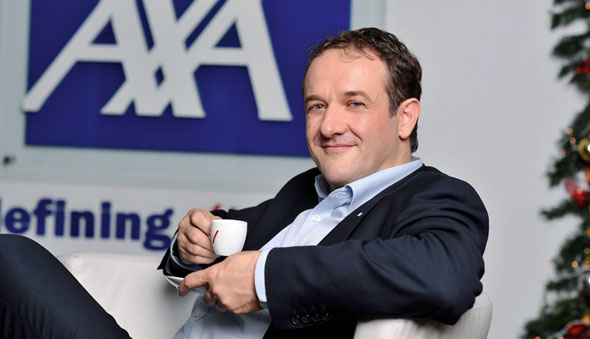

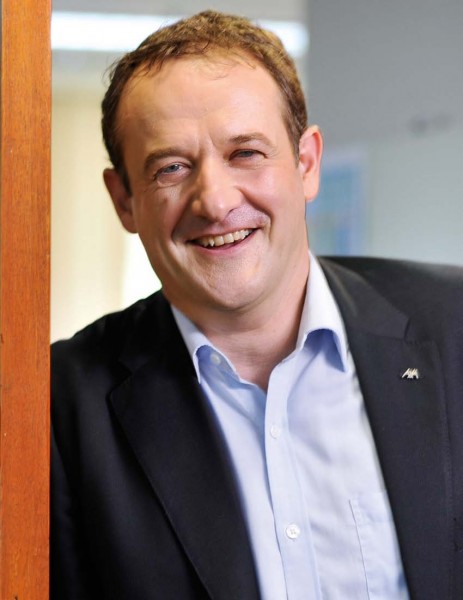
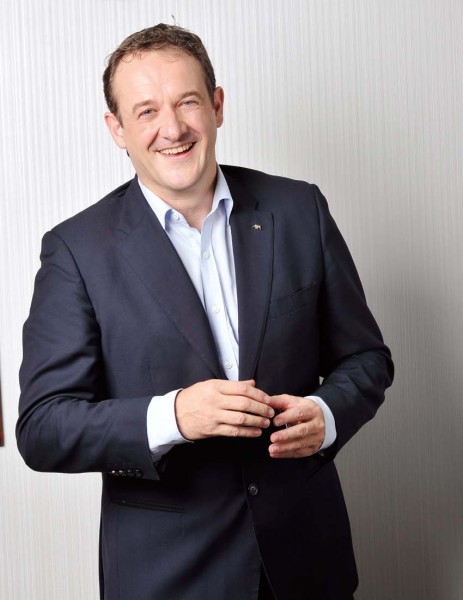
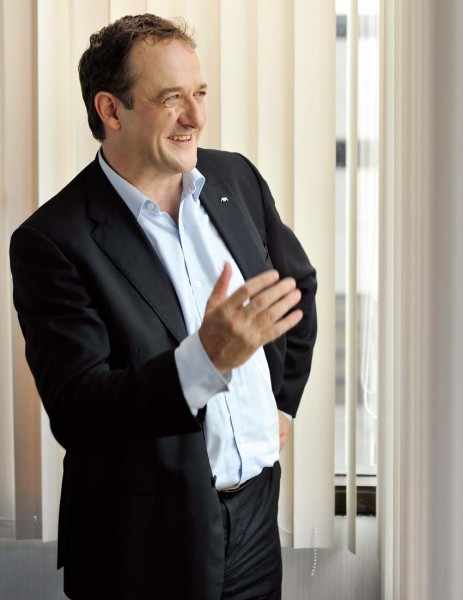
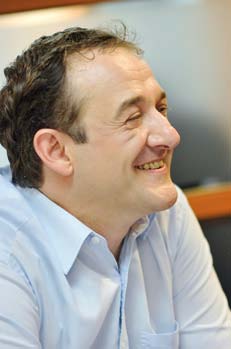
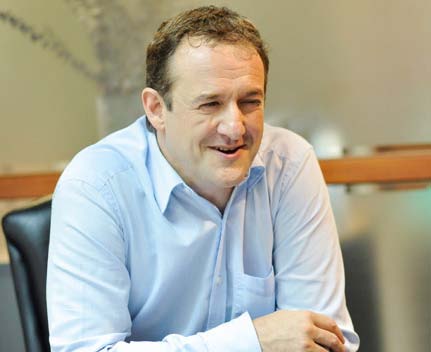
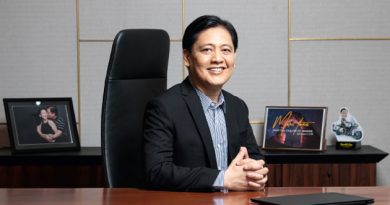


I love AXA!